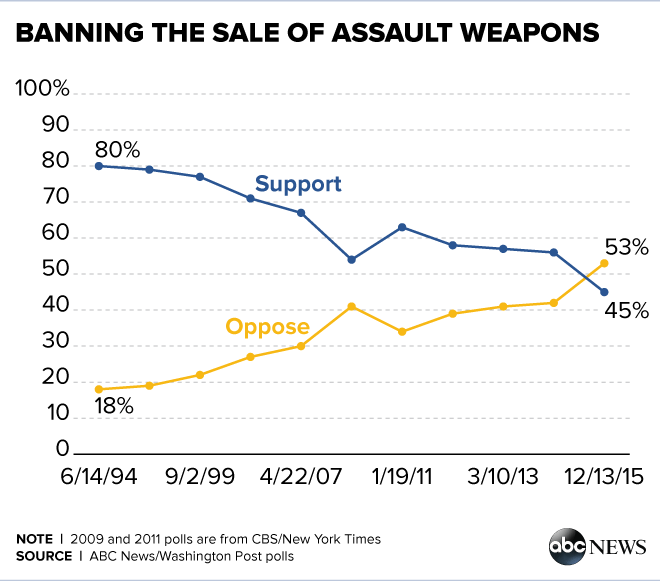For the first time that I can remember, Americans are now against even the most basic bans on automatic weapons. Fear now rules this country.
A majority of Americans oppose banning assault weapons for the first time in more than 20 years of ABC News/Washington Post polls, with the public expressing vast doubt that the authorities can prevent “lone wolf” terrorist attacks and a substantial sense that armed citizens can help.
Just 45 percent in this national survey favor an assault weapons ban, down 11 percentage points from an ABC/Post poll in 2013 and down from a peak of 80 percent in 1994. Fifty-three percent oppose such a ban, the most on record.
Indeed, while the division is a close one, Americans by 47-42 percent think that encouraging more people to carry guns legally is a better response to terrorism than enacting stricter gun control laws. Divisions across groups are vast, underscoring the nation’s gulf on gun issues.
There’s lopsided agreement on another concern: Just 22 percent express confidence in the government’s ability to prevent lone-wolf terrorist attacks, with 77 percent skeptical about it. Confidence in the government’s ability to stop a large-scale organized terrorist attack is much higher, albeit still well short of a majority -– 43 percent.
Even as recently as last year, there was still a healthy majority for doing so. No longer in the era of Trump and Cruz, as a majority of Americans now believe they are action heroes who think the purpose of a firearm is to "kill bad guys" and not to protect a home/family or to hunt.
And of course, increasingly the people with the guns get to define who the "bad guys" are.
The increase in opposition to banning assault weapons since 2013 peaks in some groups – up 18 points among strong conservatives, 17 points among higher-income earners and 16 points in the generally more liberal Northeast. But it’s a broadly based trend. Many groups have moved from majority support for an assault weapons ban two years ago to majority opposition now: whites, 30- to 64-year-olds, suburbanites, political independents, moderates, residents of the West and Midwest, anyone without a post-graduate degree and those in $100,000-plus households.
These trends leave just seven basic demographic groups in which majorities still support banning assault weapons: women, Northeasterners, seniors, post-graduates, liberals, Democrats and blacks.
Differences among groups are extensive. Barely more than a third of men favor banning assault weapons, compared with more than half of women (35 percent vs. 53 percent). Seniors are most likely to favor banning assault weapons, while – despite their greater liberalism on many other issues – nearly six in 10 young adults oppose it. Opposition is high in rural areas (64 percent) and among those who lack a college degree.
Two observations: unprecedented fear in the 24/7 BREAKING NEWS era is exhausting, and Democrats shouldn't count on Millennials, particularly white ones, as a source of voters in the future. They've made their bed, especially white men.




